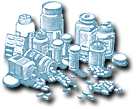|
Answering 20% of the questions wrong on tests taken in school
is generally considered better than average, earning a student
a B or C letter grade. But when it comes to hospitals providing
medication to patients, would you consider dosage mistakes
made 20% of the time acceptable?
Thirty-six hospitals accredited by the Joint Commission on
Accreditation of Healthcare Organizations, nonaccredited hospitals,
and "skilled nursing facilities" in Georgia and Colorado were
observed for medication errors in a study published in the
Archives of Internal Medicine. Fifty day-shift doses
per hospital unit, or all doses for a single medication pass,
were examined by a research pharmacist, with any medication
errors reaching patients recorded.
One in five doses were incorrect; 7% of all dosages (or nearly
40% of errors) were deemed potentially harmful to the patient.
In order of likelihood, the most frequent errors were: drugs
given at the wrong time; omission of the correct medication;
incorrect dosages; or unauthorized drugs given.
 Nobody's
perfect, but is this rate of drug errors acceptable? The authors
of this study estimate that at an average of 10 doses per
patient per day, each patient would be administered approximately
two incorrect medication errors each day. Nobody's
perfect, but is this rate of drug errors acceptable? The authors
of this study estimate that at an average of 10 doses per
patient per day, each patient would be administered approximately
two incorrect medication errors each day.
Reference:
Barker KN, Flynn EA, et al. Medication errors observed in
36 health care facilities. Archives of Internal Medicine
2002:162(16), pp. 1897-1903.
For more information on general health, go to https://www.chiroweb.com/find/archives/general.
|



